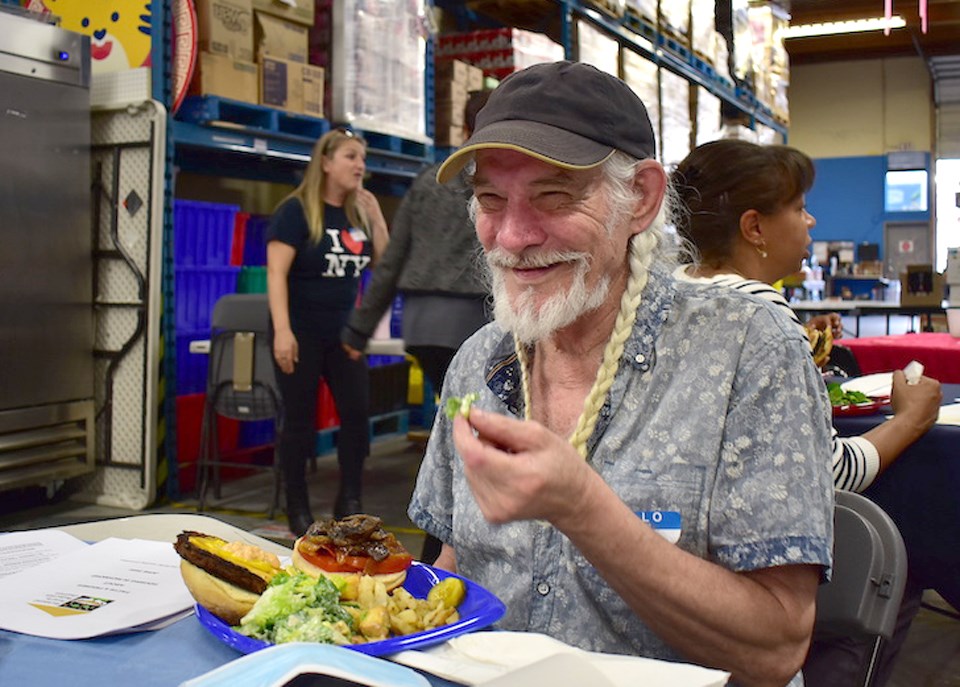Scott Newcombe calls himself a “military brat” – in other words, he grew up on naval bases, moving from town to town with a new home and a new school every year.
This ability to adapt quickly taught him resiliency – something he needed later in life when he was struggling to find a home in Richmond and Vancouver.
The first time he was evicted from his home on Vancouver’s westside, his van became his home.
He quickly learned to “pound the pavement” looking for a place to live, perfecting his presentation to potential landlords into an “art form.”
When he finally got into BC Housing six years ago, it was “like winning the lottery,” Newcombe told the Richmond News.
But this was after a 12-year wait, going from one teardown to another, moving every 12 months or so, taking in roommates to cover the rent and, at times, sleeping on someone’s couch.
Newcombe would hide his long hair, wear the right clothes, say the right thing, and always take his shoes off when entering a rental home.
“Little things like that work in the back of a landlord’s mind,” he explained.
He repeated his “winning the lottery” line several times, because he knows how hard it is to get into BC Housing - there are currently more than a thousand households in Richmond on the waitlist.
Remarkably, Newcombe exudes positivity, despite bouncing from home to home for years before “winning the lottery.” He knows other people have had it worse than him.
“When you’re living in your car, you’re thankful you’ve got a car - somebody else only has a tent. When you have a tent, you’re thankful you have a tent, because there’s a guy on the sidewalk who doesn’t even have a tent,” Newcombe said.
But he wants the government, those deciding on housing issues, to see the struggle people go through to find a stable home.
Those who have low incomes or are struggling on meagre disability benefits aren’t the only ones looking for homes. There’s the “guy with a steady job and kids” out there also competing in a tight, and expensive, rental market, and the homeless are at the “very bottom,” Newcombe pointed out.
“If you’re going to rent out to somebody, you’re not going to go to the bottom of the list,” Newcombe said.
His message to decision-makers is “don’t give up on them.”
City of Richmond asks residents about homelessness
The City of Richmond recently held two “community conversations” about homelessness, but De Whalen, president of the Richmond Poverty Reduction Coalition (RPRC) pointed out there were several barriers to attending these sessions, including a lack of widespread communication.
She herself learned about it from an online Richmond News article despite sitting on the homelessness steering committee and personally knowing city staff who work on homelessness issues.
Furthermore, registration was through the city’s online portal or by phone, and many people who don’t have stable homes and whose voices would have added to the conversation don’t have phones or computers to register for such activities, Whalen explained.
So, Richmond community activists like herself and outreach workers did what they do best: reached out to the homeless people they know and took them along to these conversations.
Whalen said it felt like the process was done just to “tick off the boxes” in an election year, showing that the city is doing something about homelessness.
On Thursday, the Richmond Poverty Reduction Coalition and the Richmond Food Bank hosted their own community roundtable to gather feedback on homelessness with about a dozen people speaking about their “lived experience” trying to find a stable, affordable home.
The sessions started with collecting words that represented how it felt looking for housing – frustration, discrimination, discouragement, long waitlists, high rents, shame and barriers were just some of the words that came up quickly for the participants.
A room of their own needed
Along with Newcombe, Nooria Ali also took part in the community forum on Thursday evening.
Ali and her husband, both in their sixties and struggling with their health, are losing sleep over the stress of not having a stable, affordable home for their senior years. They are currently living with their eldest son, but Ali knows her son wants to live his life independently.
Ali said she loves Canada, having immigrated from Afghanistan, “a very poor country,” several decades ago, and she’s grateful her children were able to grow up here.
After working as a farmworker and then in retail for decades, Ali was diagnosed with cancer several years ago, and her health has never bounced back.
Now all she asks from the government is a “room.”
Ali has been told the waitlist to get into BC Housing is three to four years.
If the government can’t increase their monthly support payments, Ali hopes they will at least give them an affordable, stable place to live.
“I’m going to ask the government, maybe you have to increase my (monetary support) so I can afford rent. If you’re not increasing my money, please at least give me one room from a subsidized house or BC Housing or other housing,” she said.
RPRC and the food bank are launching a campaign called the Richmond Electors Needing Tenancy – RENT - in anticipation of the October municipal election to highlight the urgent need for affordable rental housing in Richmond.
RPRC has three recommendations for city council: to work and collaborate with other levels of government to get affordable housing funded, to do a full review of the Low-end market rental (LEMR) program – which Whalen calls a “black box” – and to set a target of five years to halve the BC Housing waitlist.
They are hoping to present these recommendations to city council on July 11.


